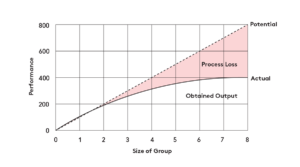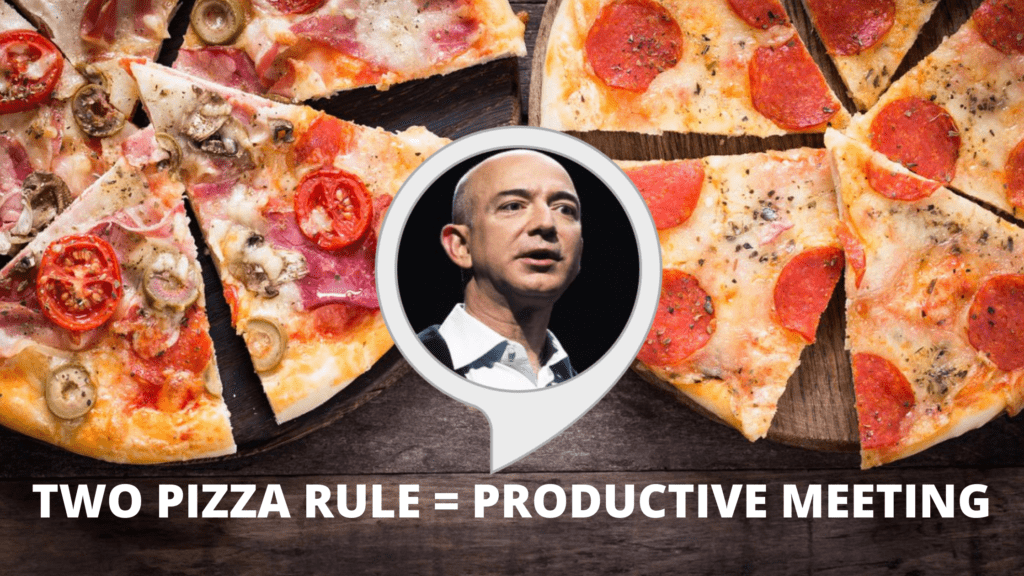How Two Pizza Rule Leads To More Productivity Meetings?
“No meeting should have people that two large pizzas cannot feed” says CEO of Amazon, Jeff Bezos.
Working in a start-up, an entrepreneur wishes he had more brains to work on the business. It is often believed that large team leads to efficient & effective work. But as per Jeff Bezos, putting more people in a team is one of the most common productivity traps an entrepreneur can fall into.
As per a research, as group size expands, more issues spring up & individual’s performance goes down as they grow less engaged and it will arise potential for more mismanagement, miscommunication and misinterpretation.
The “Two Pizza Rule” is a concept popularized by Amazon CEO Jeff Bezos, who stated that the size of a team should be small enough that two pizzas can feed the entire group. This idea is often applied to meetings, where the principle is to keep the meeting size small to ensure that everyone is able to actively participate and contribute.
Benefits of the Two Pizza Rule
By limiting the number of attendees, the Two Pizza Rule helps to promote more productive meetings in several ways:
-
Focused discussion: With fewer people in the room, meetings are less likely to become derailed by side conversations or distractions.
-
Increased participation: With fewer attendees, each person is more likely to actively participate in the conversation and contribute their ideas.
-
Better decision-making: Smaller meetings allow for more efficient and effective decision-making, as all participants have a chance to voice their opinions and consider all options.
-
Time-saving: Smaller meetings are typically shorter and more focused, which saves time and ensures that the meeting stays on track.
By following the Two Pizza Rule, teams can ensure that meetings are productive, efficient, and focused on achieving specific goals.
The Ringelmann Effect
This theory can also be well connected to Ringelmann Effect. Max Ringelmann was a French agricultural engineer who was interested in examining various aspects related to agricultural efficiency. Ringelmann’s research represents some of the earliest systematic social psychological research. As per Ringelmann effect, individuals expend less individual effort on a task when working as part of a group than when working alone. As per his research, the loss of efficiency could be due to various reasons:
- Loss of coordination
- Decrease in motivation
- Loss of sense of responsibility
- Rise in over confidence
Small teams can be more innovative, experimental & visionary as compared to larger teams. The psychology behind this concept can also be driven from an example that when an individual works in small team, he/she is more accountable for its task, however in a group; he/she is more dependable on its team. When group gets bigger, an individual feels less pressurised & less responsible because the performance gets difficult to be analysed individually. When a person is individually not answerable, he/she may start to feel disconnected.
How To Work Effectively In Small Team?
Working effectively in a small team is essential for achieving shared goals and maximizing productivity.
Here’s a concise guide on how to do it:
-
Keep Communication Strong: Open and consistent communication is key. Regularly update team members, share ideas, and be responsive to messages.
-
Maintain Transparency: Be honest and transparent about your progress, challenges, and expectations. Transparency fosters trust within the team.
-
Provide Guidance When Needed: Offer clear guidance and support when team members face difficulties. Collaboration is about helping each other succeed.
-
Keep Hierarchy and Processes Clear: Define roles and responsibilities clearly to avoid confusion. A well-defined structure ensures everyone knows their part in the team’s mission.
-
Give & Receive Frequent Feedback: Regularly provide constructive feedback to improve performance. Be open to receiving feedback as well; it’s a valuable tool for personal growth.
-
Support Each Other: Encourage a supportive atmosphere where team members help each other succeed. A strong team is built on mutual assistance and respect.
By adhering to these principles, small teams can work cohesively, achieve objectives, and maintain a positive and productive work environment.

Application to the C-Suite
The Two Pizza Rule is not limited to operational teams; it can also be applied to executive leadership. The growth of executive roles, such as Chief Technology Officer, Chief Growth Officer, and Chief Information Officer, has increased the complexity of decision-making at the highest levels. While diverse opinions are valuable, maintaining the effectiveness and efficiency of crucial discussions remains essential.
Conclusion
As businesses expand and teams grow, it becomes increasingly important to manage people and productivity effectively. The Two Pizza Rule serves as a valuable reminder for entrepreneurs and business leaders to keep teams and meetings small and focused. This approach streamlines decision-making, reduces inefficiencies, and allows individuals to concentrate more on productive work.
Ultimately, the goal is to strike a balance between collaboration and efficiency, ensuring that meetings and teams remain agile and capable of achieving their objectives in today’s dynamic business environment.



